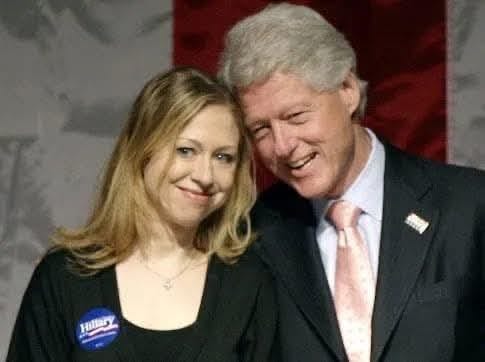Former President Bill Clinton stepped to the microphones with an unmistakable heaviness. His eyes were red, his shoulders slumped, and when he finally spoke, his voice carried the weight of a man barely holding himself together. Reporters, who had been whispering and shifting for position moments before, fell silent. Everyone could sense it: this wasn’t politics, ceremony, or routine. This was deeply personal.
He paused longer than usual, gripping the podium as if to ground himself. Cameras clicked, news tickers froze, and across the country, people leaned into their screens. When he began, it wasn’t with the polished cadence of a statesman but with the rawness of someone forced to deliver a message he wished he never had to give.
Over the next several minutes, Clinton spoke unlike ever before. He paused often, choosing each word carefully. There was no charm, no trademark smile. Instead, he walked the audience through a storm — a crisis his family had been facing quietly while the world remained unaware. He described sleepless nights, private struggles, and a quiet fear that had gripped those closest to him. His words painted heartbreak, but also devotion — a reminder that public stature does not shield anyone from life’s fragile realities.
The tension in the room shifted. Reporters lowered their hands; there was no space for politics or headlines. Clinton spoke as a father, a husband, a man witnessing a loved one endure something unbearable. He spoke of courage, fragility, and life’s relentless unpredictability. Each sentence came like an exhale, releasing months of pent-up grief.
He spoke of family — not the public image, not the photographs — but real bonds forged through years of private struggle. He described resilience, grace under fear, and quiet strength that never makes headlines. His voice cracked at times, each fracture revealing another layer of the heartbreak he carried.
At one point, he stepped away, pressing a hand to his mouth while regaining composure. Offered water, he gently declined. Returning to the microphone, he apologized, though perfection wasn’t expected. This was not a political statement; it was a confession of grief, love, and helplessness.
By the time he reached the core of his message, the room felt suspended in time. He urged the public to cherish loved ones, forgive sooner, speak softer, and recognize that no amount of status shields anyone from loss.
His words extended beyond his family. He acknowledged countless others facing fear in hospitals, homes, and quiet corners nationwide. He honored nurses and doctors guiding families through dark hours and thanked strangers offering prayers and support. His gratitude sounded genuine, the relief of a man comforted by unexpected kindness.
The emotional climax came when Clinton revealed the reason for his public appearance — a loss so profound it explained every tremor in his voice. He paused, breathed deeply, and delivered the words with devastating clarity. This was not politics, nor state affairs. It was profoundly human — a final chapter in a story the public had followed for decades. The announcement rippled outward. Camera operators lowered their equipment. Some reporters quietly wiped their eyes. It was a moment simply tragic, beyond debate.
Clinton closed reflecting on legacy — not his own, but that of the person at the center of this grief. He spoke of memories, joy, and the quiet moments that never reach headlines. He pleaded for compassion and for his family to grieve in dignity.
When he left the podium, he did not linger, take questions, or shake hands. Surrounded by aides equally shaken, he walked away slowly. Silence lingered in the room long after his departure.
Outside, the nation absorbed the news with collective heaviness. Social media filled with memories, tributes, photographs, and sympathy. Politicians paused hostilities to offer support. Public figures and private citizens alike shared stories of the Clintons’ quiet impact.
In the hours that followed, it became clear this moment would be remembered not for political significance, but for its humanity: a former president stripped of rehearsed lines, offering the raw truth of a man in mourning.
As America watched, the message transcended the announcement: even the most powerful among us face the same unyielding truths of love, loss, and the fragile threads that hold our lives together.
